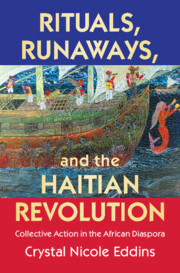Book contents
- Rituals, Runaways, and the Haitian Revolution
- Cambridge Studies on the African Diaspora
- Rituals, Runaways, and the Haitian Revolution
- Copyright page
- Dedication
- Contents
- Figures
- Tables
- Acknowledgements
- Introduction
- I Homelands, Diaspora, and Slave Society
- II Consciousness and Interaction: Cultural Expressions, Networks and Ties, Geographies and Space
- III Collective Action and Revolution
- Conclusion
- Notes
- References
- Index
Conclusion
- Rituals, Runaways, and the Haitian Revolution
- Cambridge Studies on the African Diaspora
- Rituals, Runaways, and the Haitian Revolution
- Copyright page
- Dedication
- Contents
- Figures
- Tables
- Acknowledgements
- Introduction
- I Homelands, Diaspora, and Slave Society
- II Consciousness and Interaction: Cultural Expressions, Networks and Ties, Geographies and Space
- III Collective Action and Revolution
- Conclusion
- Notes
- References
- Index
Summary
The project of modernity, how, when, and where it began and who produced it, continues to plague historians and sociologists alike. Writing in 1925 as she accepted her diploma for completion of the doctoral dissertation L’Attitude de la France à l’égard de l’esclavage pendant la révolution [Slavery and the French Revolutionists, 1788–1805], Anna Julia Cooper’s remarks instruct us to be constantly in search of self-defined expressions of humanity and development beyond the scope of the Western world. Cooper’s dissertation did just that in expanding study of the French Revolution to its imperial territories in the Caribbean – Saint-Domingue specifically – to make the case that without consideration of racial slavery in the colonies, the political and philosophical ideals propagated by the Declaration of the Rights on Man and the Citizen were woefully incomplete. That Cooper used water, currents, and the ocean to symbolize human movement toward new, liberated, modes of being is perhaps an irony, given that movement across the Atlantic Ocean was largely a voyage toward unfreedom for captive Africans. Still, even the lives of those who survived oceanic journeys and were enslaved in the Americas were not without alternate flows, bends, and radical turns that would alter the course of human history; the “currents” of which Cooper spoke were and are not linear.
- Type
- Chapter
- Information
- Rituals, Runaways, and the Haitian RevolutionCollective Action in the African Diaspora, pp. 301 - 304Publisher: Cambridge University PressPrint publication year: 2021

